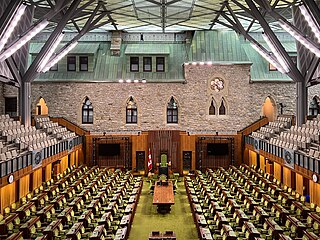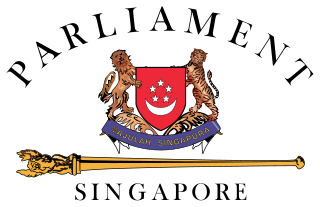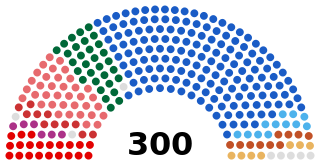Related Research Articles

The House of Commons is the lower house of the Parliament of the United Kingdom. Like the upper house, the House of Lords, it meets in the Palace of Westminster in London, England. The House of Commons is an elected body consisting of 650 members known as members of Parliament (MPs). MPs are elected to represent constituencies by the first-past-the-post system and hold their seats until Parliament is dissolved.

The Parliament of the United Kingdom of Great Britain and Northern Ireland is the supreme legislative body of the United Kingdom, and may also legislate for the Crown Dependencies and the British Overseas Territories. It meets at the Palace of Westminster in London. Parliament possesses legislative supremacy and thereby holds ultimate power over all other political bodies in the United Kingdom and the Overseas Territories. While Parliament is bicameral, it has three parts: the sovereign, the House of Lords, and the House of Commons. The three parts acting together to legislate may be described as the King-in-Parliament. The Crown normally acts on the advice of the prime minister, and the powers of the House of Lords are limited to only delaying legislation.

Cloture, closure or, informally, a guillotine, is a motion or process in parliamentary procedure aimed at bringing debate to a quick end.

The House of Commons of Canada is the lower house of the Parliament of Canada. Together with the Crown and the Senate of Canada, they comprise the bicameral legislature of Canada.

A filibuster is a political procedure in which one or more members of a legislative body prolong debate on proposed legislation so as to delay or entirely prevent a decision. It is sometimes referred to as "talking a bill to death" or "talking out a bill", and is characterized as a form of obstruction in a legislature or other decision-making body.
A motion or vote of no confidence is a formal expression by a deliberative body as to whether an officeholder is deemed fit to continue to occupy their office. The no-confidence vote is a defining feature of parliamentary democracy which allows the elected parliament to either affirm their support or force the ousting of the cabinet. Systems differ in whether such a motion may be directed against the prime minister only or against individual cabinet ministers.
A private member's bill is a bill introduced into a legislature by a legislator who is not acting on behalf of the executive branch. The designation "private member's bill" is used in most Westminster system jurisdictions, in which a "private member" is any member of parliament (MP) who is not a member of the cabinet (executive). Other labels may be used for the concept in other parliamentary systems; for example, the label member's bill is used in the Scottish Parliament and the New Zealand Parliament, the term private senator's bill is used in the Australian Senate, and the term public bill is used in the Senate of Canada. In legislatures where the executive does not have the right of initiative, such as the United States Congress, the concept does not arise since bills are always introduced by legislators.

The Speaker of the House of Commons is the presiding officer of the House of Commons, the lower house and primary chamber of the Parliament of the United Kingdom. The current speaker, Sir Lindsay Hoyle, was elected Speaker on 4 November 2019, following the retirement of John Bercow. Hoyle began his first full parliamentary term in the role on 17 December 2019, having been unanimously re-elected after the 2019 general election.

The House of Representatives is the sole chamber of the New Zealand Parliament. The House passes laws, provides ministers to form Cabinet, and supervises the work of government. It is also responsible for adopting the state's budgets and approving the state's accounts.

The Parliament of Malaysia is the national legislature of Malaysia, based on the Westminster system. The bicameral parliament consists of the Dewan Rakyat and the Dewan Negara. The Yang di-Pertuan Agong (King), as the head of state, is the third component of Parliament.

The Dewan Rakyat is the lower house of the bicameral Parliament, the federal legislature of Malaysia. The chamber and its powers are established by Article 44 of the Constitution of Malaysia. The Dewan Rakyat sits in the Houses of Parliament in Kuala Lumpur, along with the Dewan Negara, the upper house.

The Parliament of Singapore is the unicameral legislature of the Republic of Singapore, which governs the country alongside the president of Singapore. Largely based upon the Westminster system, the Parliament is made up of Members of Parliament (MPs) who are elected, as well as Non-constituency Members of Parliament (NCMPs) and Nominated Members of Parliament (NMPs) who are appointed. Following the 2020 general election, 93 MPs and two NCMPs from three political parties were elected to the 14th Parliament. Throughout the sitting of Parliament, nine NMPs are usually appointed by the president on a biennial basis.

The Parliament of the Hellenes, commonly known as the Hellenic Parliament, is the unicameral legislature of Greece, located in the Old Royal Palace, overlooking Syntagma Square in Athens. The parliament is the supreme democratic institution that represents the citizens through an elected body of Members of Parliament (MPs).
In the United Kingdom, confidence motions are a means of testing the support of the government (executive) in a legislative body, and for the legislature to remove the government from office. A confidence motion may take the form of either a vote of confidence, usually put forward by the government, or a vote of no confidence, usually proposed by the opposition. When such a motion is put to a vote in the legislature, if a vote of confidence is defeated, or a vote of no confidence is passed, then the incumbent government must resign, or call a general election.

The Fixed-term Parliaments Act 2011 (FTPA) was an Act of the Parliament of the United Kingdom which, for the first time, set in legislation a default fixed election date for general elections in the United Kingdom. It remained in force until 2022, when it was repealed. Since then, as before its passage, elections are required by law to be held at least once every five years, but can be called earlier if the prime minister advises the monarch to exercise the royal prerogative to do so. Prime ministers have often employed this mechanism to call an election before the end of their five-year term, sometimes fairly early in it. Critics have said this gives an unfair advantage to the incumbent prime minister, allowing them to call a general election at a time that suits them electorally. While it was in force, the FTPA removed this longstanding power of the prime minister.

Parliamentary votes on Brexit, sometimes referred to as "meaningful votes", were the parliamentary votes under the terms of Section 13 of the United Kingdom's European Union (Withdrawal) Act 2018, which requires the government of the United Kingdom to bring forward an amendable parliamentary motion at the end of the Article 50 negotiations between the government and the European Union in order to ratify the Brexit withdrawal agreement.

The European Union (Withdrawal) Act 2019, commonly referred to as the Cooper–Letwin Act, was an Act of the Parliament of the United Kingdom that made provisions for extensions to the period defined under Article 50 of the Treaty on European Union related to the United Kingdom's withdrawal from the European Union. It was introduced to the House of Commons by Labour MP Yvette Cooper and Conservative MP Sir Oliver Letwin on 3 April 2019, in an unusual process where the Government of the United Kingdom did not have control over Commons business that day.

The European Union (Withdrawal) Act 2019, informally referred to as the Benn Act, was an act of the Parliament of the United Kingdom that required the Prime Minister of the UK to seek an extension to the Brexit withdrawal date—then scheduled for 31 October 2019—in certain circumstances. The main provisions of the Act were triggered if the House of Commons did not give its consent to either a withdrawal agreement or leaving without a deal by 19 October 2019. The Act proposed a new withdrawal date of 31 January 2020, which the Prime Minister accepted if the proposal was accepted by the European Council.
On 28 August 2019, the Parliament of the United Kingdom was ordered to be prorogued by Queen Elizabeth II on the advice of the Conservative prime minister, Boris Johnson – advice which was later ruled unlawful. The prorogation, or suspension, of Parliament was to be effective from some point between 9 and 12 September 2019 and would last until the State Opening of Parliament on 14 October 2019. As a consequence, Parliament was suspended between 10 September and 24 September 2019. Since Parliament was to be prorogued for five weeks and reconvene just 17 days before the United Kingdom's scheduled departure from the European Union on 31 October 2019, the move was seen by many opposition politicians and political commentators as a controversial and unconstitutional attempt by the prime minister to avoid parliamentary scrutiny of the Government's Brexit plans in the final weeks leading up to Brexit. Johnson and his Government defended the prorogation of Parliament as a routine political process that ordinarily follows the selection of a new prime minister and would allow the Government to refocus on a legislative agenda.
References
- ↑ Sparrow, Andrew (29 April 2009). "Defeat for Gordon Brown over Gurkhas". The Guardian. Retrieved 13 February 2019.
- ↑ Mairs, Nicholas (14 September 2017). "Government under fire over 'jaw dropping' move to dodge opposition day votes". PoliticsHome . Retrieved 13 February 2019.
- ↑ "Revealed: 90% of Tories who made £1.3m from second jobs voted against free school meals".
- ↑ https://www.instituteforgovernment.org.uk/comment/party-political-game-playing-gaza-parliament
- ↑ "Glossary of Parliamentary Procedure - House of Commons". www.ourcommons.ca. Retrieved 13 February 2019.